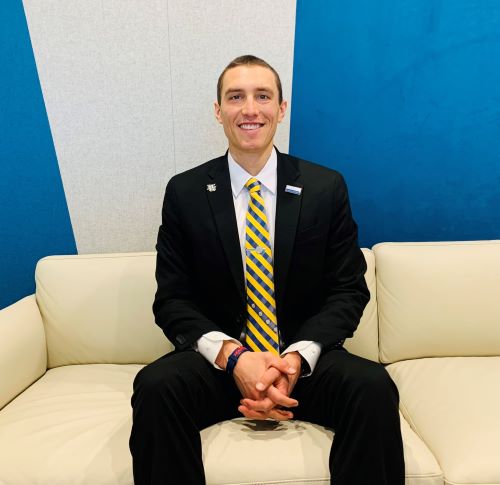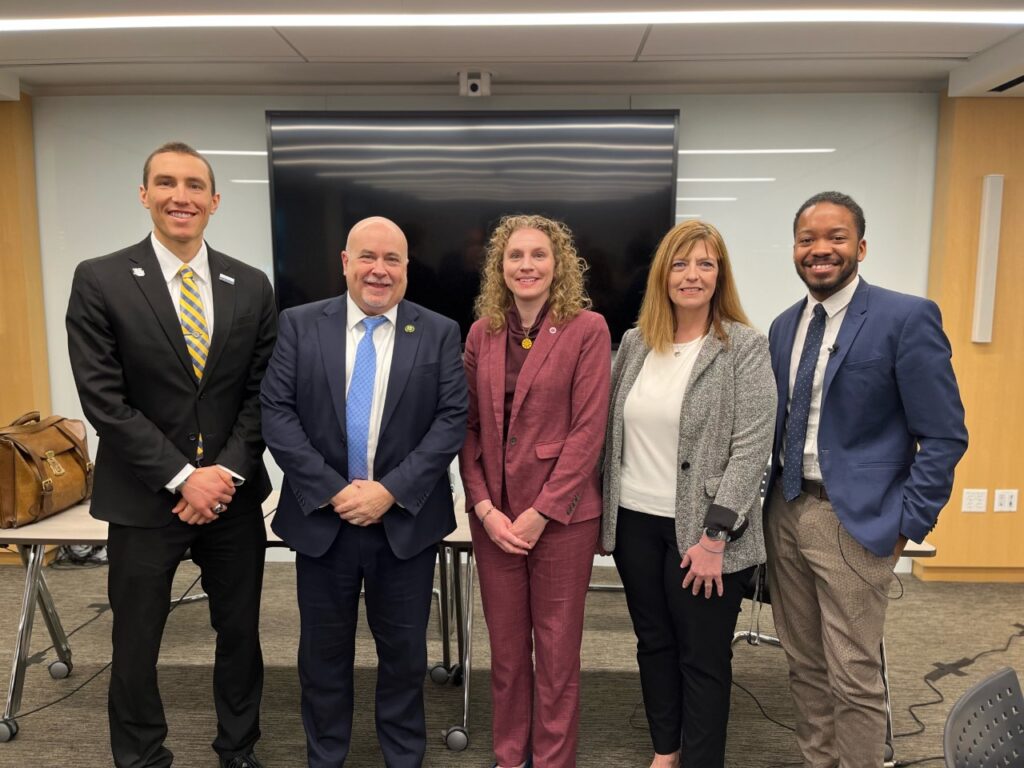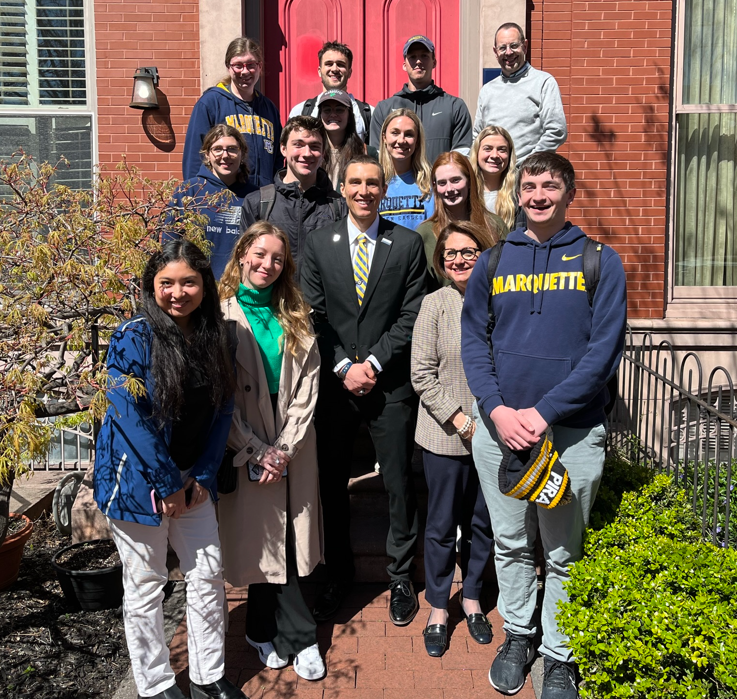From Blue Hen to Golden Eagle: Jacob Capin’s Journey from Athlete to Investigator
 Jacob J. Capin, PT, DPT, PhD, MS, is an assistant professor and director of the Life After Sport Trajectories (LAST) Lab at Marquette University. He is a recipient of the 2017 VCU-Marquette Challenge Award for exceptional achievement within a Promotion of Doctoral Studies (PODS I) in 2017 and a PODS II in 2018. He recently traveled to Washington, DC to demonstrate the impact of federal funds on physical therapy research and stopped by the for Physical Therapy Research for a chat about his early influences, career choices, research priorities, and more.
Jacob J. Capin, PT, DPT, PhD, MS, is an assistant professor and director of the Life After Sport Trajectories (LAST) Lab at Marquette University. He is a recipient of the 2017 VCU-Marquette Challenge Award for exceptional achievement within a Promotion of Doctoral Studies (PODS I) in 2017 and a PODS II in 2018. He recently traveled to Washington, DC to demonstrate the impact of federal funds on physical therapy research and stopped by the for Physical Therapy Research for a chat about his early influences, career choices, research priorities, and more.
Tell us a little bit about your early life and influences.
I was born and raised in the eastern part of Virginia and grew up playing sports. Sport was always a big part of my life; I first got introduced to the health professions after I broke my arm (playing soccer of all things!) when I was in seventh grade. From that time forward, I knew I wanted to be in the health professions.
I ended up getting really into basketball—I trained a few hours per day every day from age 12 onward into college. Basketball was a huge part of my identity and helped shape my career. I played college basketball at Campbell University, a small division one school down in North Carolina, and majored in kinesiology. I was loving my kinesiology coursework, loving my coursework in biomechanics, and starting to think about how I could use my different interests and passions. I transferred to Christopher Newport University in Newport News, Virginia, where I majored in psychology- appreciating more fully the interaction of mind and body.
Later I learned about the dual degree program at the University of Delaware where you could pursue a doctorate in physical therapy as well as a PhD in Biomechanics and Movement Science. Once I found out about that I realized: that’s my calling. That’s my career path. It was in that time that I homed in on what I do today: researching long term health in athletes and being a professor of physical therapy.
I went to the University of Colorado School of Medicine for my postdoc where I had an advanced geriatrics fellowship studying older adults after joint replacement, especially knee and hip replacements. I also participated in a project on COVID telerehabilitation that became NIH funded as well. And that brings me to Marquette to where I am today.
What was it that you found compelling about this course of study?
For me as an athlete, and as somebody for whom movement was so essential to my own health and well-being, it was an opportunity to personally be able to explore, to learn, and to be more invested. Also, it incorporates many different talents or areas of study: you’re helping patients, you’re doing research, you’re teaching students to be the next generation. It’s just this awesome combination of different areas. I appreciate diversity of experience and opportunity.
Can you tell us a little bit about your professional journey?
I teach kinesiology, which is great, full circle from what I was studying as a freshman/sophomore in college. I have a research-heavy position where I’m predominantly conducting research into long term health in athletes based at the Athletic and Human Performance Research Center at Marquette. And of course, I also do service both at the department, college, university and of course, national level as well.
Tell us a little bit about what brought you to DC.
It was a Wisconsin politics event; Wisconsin Congressman Mark Pocan talked about the benefit of federal funding on research, and then the impact of federal funding or federal research dollars on Wisconsinites. I was one of —the only physical therapist—all with significant federal funding.

WisPolitics Breakfast Panel (from left) Capin, Congressman Mark Pocan, Dr. Stephanie Diem, Dr. Michele Polfuss, and moderator Taurean Small of Spectrum News
What kind of research have you been working on?
During my PhD, I studied athletes after traumatic knee injuries, specifically ACL injury, and we looked at outcomes: return to sport outcomes, as well as longer term health outcomes like osteoarthritis. I was treating these individuals and sometimes having individuals who would have a second or a third or a fifth traumatic knee injury. And I thought: how can we best position them for long term health?
For my postdoc I intentionally studied a different end of the spectrum: older adults, and some who are not so old, but on that spectrum of older adults after joint replacement.
COVID hit, and elective surgeries got shut down for a few months. And so that research continued to happen but at a much slower pace. I had the great fortune of also working with individuals who had been hospitalized due to COVID and we designed a fully remote tele-rehabilitation program.
These different experiences that I’ve had—working with young athletes and their parents and coaches and athletic trainers, working with adults after joint replacement, working with people who are trying to improve activity—have been perfect to train me to do the research that I do today, which is really my life’s work and my passion: to study long term health and athletes.
Sports medicine typically focuses on getting individuals back to sport after injury or rehabilitating them from injury and then, as a second goal, preventing re-injury. Those are great goals. The mission of our lab is really looking at much later on in life: how do we optimally position individuals, young athletes to be healthy, long term?
What role has the Foundation played in your research journey?
The Foundation has played an instrumental role; a transformative role. At the Marquette Gala last fall I said that my Foundation funding was life changing, and I really mean that. My first extramural award was a PODS I scholarship from the Foundation that I got during my PhD training. And I was fortunate the following year to get a PODS II scholarship. I was then able to apply for funding from NIH. The Foundation’s PODS scholarships were a huge asset to have in my application.
Fast forward a couple of years: I applied for and received the NIH Directors Early Independence Award, which is an R01 equivalent. That funds my research lab now. I’m very fortunate to have that in terms of what it’s done for my career, my research lab and my research vision in general. I attribute this to funding that I received from the Foundation. I know the Foundation often talks about the impact that the smaller awards have, and how they go on to transform research and how they benefit physical therapist research. And that is so true.
Just the recognition of the award from the Foundation for my long-term research has been instrumental. In summary, I’d say it’s been a transformative and really rewarding experience.
What is the value of physical therapy research? Who does it benefit and how?
Patients- our end goal as healthcare providers is to make our patients better and get them back to what they want to do.
It also affects our healthcare system: physical therapy is a relatively low-cost high value service. However, I think we need more evidence, more research to really demonstrate our value. As we look at health care and changing health care models, we need to have documented value to our services.
I think that research is what we need to show that physical therapy matters, and to answer questions like: Why is physical therapy better than some other intervention or interventions that perhaps have more costs and/or greater risks? How do we document physical therapy’s benefit, financially as well as clinically?
Any final thoughts?
The Foundation for Physical Therapy Research has been instrumental in my career and in terms of not just the funding that I talked about, but also showing the impact and value of physical therapy research. It’s helping to provide that belief in researchers, especially early-career researchers through the PODS and NIFTI scholarships to launch their careers.

Capin with Marquette University students at Marquette University’s Les Aspin Center for Government
We need more clinician scientists to answer and address clinically relevant questions. We need more research-trained clinicians to teach our future physical therapists so that they become evidence-based practitioners and help develop clinical research questions that maybe don’t require a PhD and don’t require an academic setting. I think we still have a long way to go as a profession and the Foundation for Physical Therapy Research is really helping us move forward.
STAY CONNECTED
Use this form to sign up for the Foundation for Physical Therapy Research monthly newsletter.
Jacob Capin on the Foundation’s role in funding physical therapy research.